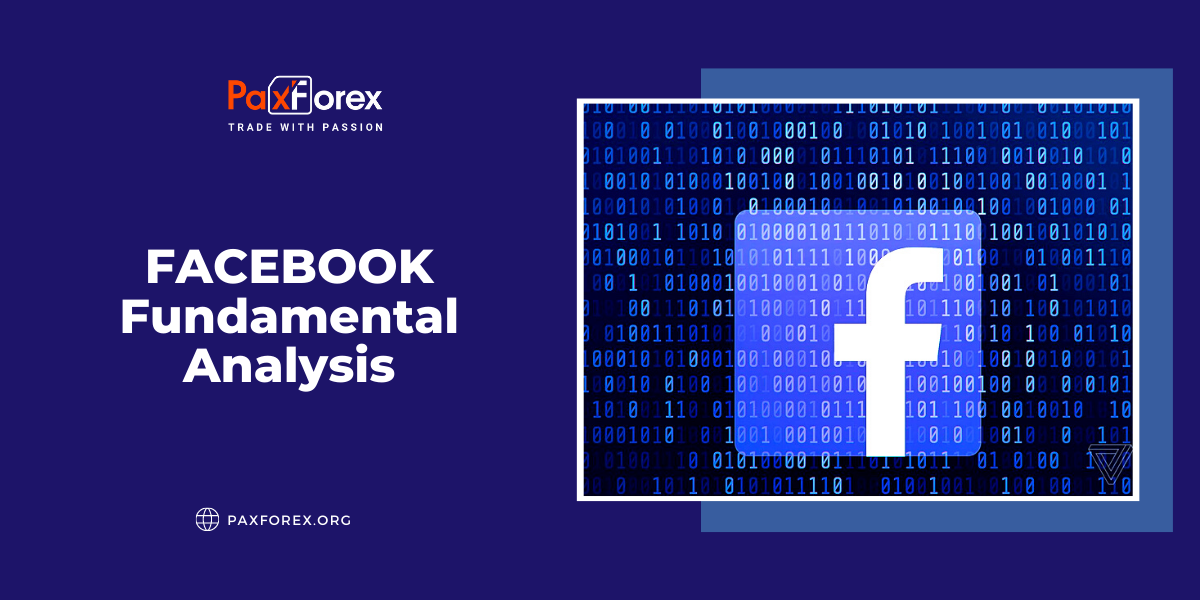
Source: PaxForex Premium Analytics Portal, Fundamental Insight
The earnings season has been tough for many investors, especially those who own technology and Internet stocks. Even though it's less than three months into 2022, many high-growth stocks have already fallen 30% or more this year, which is hard to weather. Meta Platforms, the parent company of Facebook, Instagram, WhatsApp, and Oculus, is one such company. The stock is down 40% for the year after the company issued a poor first-quarter outlook and suffered a sell-off in the broad market in early 2022.
If you're thinking about buying Meta Platforms stock, it might be wise to do some modeling and estimate how big this business could be in a few years. Where will Meta Platforms be in a few years? Let's try to figure it out.
On February 2, Meta Platforms released its earnings for the last three months of 2021. Revenue for the quarter rose 20% year over year to $33.7 billion, and earnings per share (EPS) was $3.67, slightly lower than last year. Both met analysts' expectations.
All of these fourth-quarter numbers were good, but the big surprise was Meta's outlook for the first quarter of 2022. First-quarter earnings are expected to be between $27 billion and $29 billion, which was much less than the $30.1 billion analysts were expecting. Given this disappointment, Meta's stock fell 20% within days of the report's release, causing a significant drop in its share price.
When the company changed its name from Facebook to Meta Platforms, management decided to change the way it presents its financials. The company now has two segments: the "family of apps" (Facebook, WhatsApp, Instagram) and "reality labs" (the metaverse and virtual reality division). The "family of apps" division, although overshadowed by controversy, has continued to grow both revenue and profits over the past few years. From 2019 to 2021, revenue in this segment grew from $70 billion to $115.7 billion and operating income from $28.5 billion to $56.9 billion.
With a market capitalization of $556 billion, this gives Meta stock a very cheap price to operating income (P/OI) of 9.8 based on the app family division. So why are investors discounting the app family so much when social media apps continue to grow and increase their profitability?
The uncertainty comes from another segment of Meta, the reality lab that houses Oculus and its virtual/augmented reality research division. That division will burn $10.2 billion in 2021, which is exactly the annual burn rate that Mark Zuckerberg says will sustain the division for the foreseeable future. At $2.2 billion in revenue in 2021 (a small amount for a company this size), the division still has a long way to go in terms of growth and a lot of uncertainty about whether this investment will turn into a viable business. Given this uncertainty and how much money the division is expected to lose, it's understandable that investors are nervous about these moves by Meta Platforms.
Unlike almost any other business that burns through $10 billion a year in venture capital bets, this business is good in that it is still capable of generating tons of cash for shareholders. Meta Platforms had a free cash flow of $39 billion in 2021, up from $23.6 billion in 2020, which is pretty impressive considering how much money the reality lab division is losing.
With so much cash flow, Meta Platforms has begun to return some money to shareholders in the form of share buybacks. Meta's stock is down 5.9% over the past five years, with most of that decline coming in the last year or so. By comparison, management spent $19 billion on stock buybacks in Q4 2021 alone. At its current market capitalization of $556 billion, Meta should be able to reduce its stock by about 7% in 2022 if it spends all of its 2021 free cash flow on share buybacks.
Given the differences between Meta's two operating segments, it is difficult to estimate where the business will be in early 2025. Likely, the Reality Labs division will still burn through $10 billion a year, as that is Zuckerberg's stated plan at this point. The app family is harder to predict because of the nature of the social media industry. However, if we assume revenue growth of 10 percent a year (which would be a big slowdown compared to historical growth rates) over the next three years with stable operating margins, then in three years the Meta app family division will generate about $76 billion in annual operating income.
If you subtract $10 billion in losses from the lab, Meta Platforms' consolidated operating income could be $66 billion in 2024. At the company's current market value of $556 billion (which does not include any share buyback benefits), that would give a P/OI of 8.4. Unless something drastic happens to the stock market as a whole, there is a chance that Meta Platforms stock will be significantly higher in a few years.
As long as the price is below the 247.00 level, follow the recommendations below:
- Time frame: D1
- Recommendation: short position
- Entry point: 211.06
- Take Profit 1: 185.00
- Take Profit 2: 170.00
Alternative scenario:
If the level of 247.00 is broken-out, follow the recommendations below:
- Time frame: D1
- Recommendation: long position
- Entry point: 247.00
- Take Profit 1: 288.00
- Take Profit 2: 327.00













